Iban people
 | |
| Total population | |
|---|---|
| approximately800, 000+ | |
| Regions with significant populations | |
| Borneo: | |
| 702, 579[1] | |
| 23,500[2] | |
| 19,978[3] | |
| Languages | |
| Predominantly:Iban Also:Sarawak Malay,Brunei Malay,Standard Malay,West Kalimantan Malay,EnglishandIndonesian | |
| Religion | |
| Christianity(Majority) (Catholicismand MainlyAnglicanism),Islam,Animism,Irreligion(Minority) | |
TheIbansorSea Dayaksare anAustronesianethnic group indigenous to northwestern Borneo.[4]The Ibans are also known as Sea Dayaks and the titleDayakwas given by theBritishand theDutchto various ethnic groups in Borneo island.[5]
Ibans were renowned for practicingheadhuntingand territorial migration, and had a fearsome reputation as a strong and successfully warring tribe. Since the arrival for Europeans and the subsequent colonisation of the area, headhunting gradually faded out of practice, although many other tribal customs and practices as well as theIban languagecontinue to thrive.
The Iban population is concentrated in the state ofSarawakinMalaysia,Brunei,and theIndonesianprovince ofWest Kalimantan.They traditionally live inlonghousescalledrumah panjaiorbetang(trunk) inWest Kalimantan.[6][7]
Etymology
[edit]- Iban,The terms Iban came from the Iban language itself which means "human" or "people".
- Sea Dayak,Despite the fact being referred as Sea Dayaks due to their maritime skills, the Ibans are originally an interior ethnic group from the headwater ofKapuasbefore the period of mass migration from 1750s.[4][8]
History
[edit]Early origins
[edit]The Iban people of Borneo possess an indigenous account of their history, mostly in oral literature,[9]partly in writing inpapan turai(wooden records), and partly in common cultural customary practices.[10]
According to native myths and legends, they historically came fromKapuas riverinKalimantan(Indonesian Borneo). They slowly moved toSarawakdue to tribal issues.[11][12]The ancient Iban legend is also being supported by several modern-day linguistic studies by Asmah Haji Omar (1981), Rahim Aman (1997), Chong Shin and James T. Collins (2019) and material cultures by M. Heppell (2020) that traces the Iban language and culture originated from the upper Kapuas.[8]
The period of great migration
[edit]
Based on the research conducted byBenedict Sandin(1968), the period of Iban migrations from the Kapuas Hulu Range were determined to commenced from the 1750s.[8]These settlers were identified to enterBatang Luparand established settlement adjacent to the Undop River. In the period of five generations, they expanded towards west, east and north, founding new settlements within the tributaries of Batang Lupar,Batang Sadong,Saribasand Batang Layar.
By the 19th century during the Brooke administration, the Ibans started to migrate towards the basin of Rejang via the upper reach of Katibas River, Batang Lupar and Saribas River. From 1870s, it was recorded that a huge populations of Ibans have established nearMukahand Oya River. The settlers arrived toTatau,Kemena(Bintulu) and Balingan by the 1900s. In the turn of twentieth century, the Iban expanded to theLimbang RiverandBaramvalley in the northern Sarawak.
Based on the colonial accounts, the migrations during the Brooke rule has generated several complications in the state, as the Ibans can easily exceeded the other pre-existing tribes and caused an unfavorable environmental impact on the land areas originally designated forswidden agriculture.Thus, they were prohibited by theauthoritiesto emigrate towards other river systems. The tension between theBrooke administrationand the Ibans were recorded in Balleh Valley.[8]
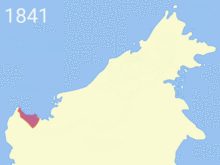
Despite the fact that the early migration created challenges for the Brooke administration, it conversely introduced favorable circumstances. The Ibans and their wide knowledge of the land and forest produce were promoted by Brooke to explore the new areas to seekrattans,camphor,damar, wildrubberand other natural products. The authority also supported perpetual Iban settlements in the newly ceded areas ofSarawak.This can be seen during the 1890 annexation of Limbang where the Sarawak government trusting on the Ibans to aid its authority. A similar process also took place in Baram.[8]
By the end of 1800s, several areas in Sarawak including Batang Lupar, Skrang Valley and Batang Ai were experiencing overpopulation. With several conditions, the Sarawakian government opened several territories for the Iban community. For instance, the government granted theSimanggangIbans unlimited migration towards Bintulu, Baram and Balingan; while in the early 20th century, the Ibans from theSecond Divisionof Sarawak were allowed to emigrate to Limbang, and the government additionally helped the movement of Ibans toLundufrom Batang Lupar.[8]
The government-sponsored policy has left a positive impact on the spread of Iban language and culture throughout Sarawak. Nonetheless, the migrations have also affected other groups as well, as in the case of the Bukitans in Batang Lupar, where the process ofintermarriageby the Bukitan leaders has slowly stimulated the whole Batang Lupar Bukitan populations to adopt the Iban way of life, thus assimilating the ethnicity into the Iban community. Some other groups have a more hostile relationship, as in the case ofUkits,Seru, Miriek and Biliun where the populations were almost totally replaced by the Ibans.[13]
18th–19th century
[edit]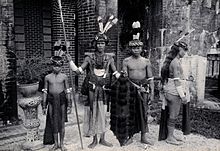
The colonial accounts and reports of Dayak activity in Borneo detail carefully cultivated economic and political relationships with other communities as well as an ample body of research and study concerning the history of Dayak migrations.[14]In particular, the Iban or the Sea Dayak exploits in the South China Seas are documented, owing to their ferocity and aggressive culture of war against sea-dwelling groups and emerging Western trade interests in the 18th and 19th centuries.[14]
In 1838, adventurerJames Brookearrived in the region to find theSultan of Bruneiin a desperate attempt to suppress a rebellion against his rule. Brooke aided the Sultan in putting down the rebellion, for which he was made Governor of Sarawak in 1841, being granted the title ofRajah.Brooke undertook operations to suppress Dayak piracy, establishing a secondary objective to put an end to their custom of headhunting as well. During his tenure as Governor, Brooke's most well-known Dayak opponent was the military commanderRentap;Brooke led three expeditions against him and finally defeated him at theBattle of Sadok Hill.During the expeditions, Brooke employed numerous Dayak troops, quipping that "only Dayaks can kill Dayaks".[15]
Brooke became embroiled in controversy in 1851 when accusations against him of excessive usage of force against the Dayaks, under the guise of anti-piracy operations, ultimately led to the appointment of a Commission of Inquiry inSingaporein 1854. After an investigation, the Commission dismissed the charges.[16]Brooke employed his Dayak troops during other military expeditions, such as those against the Chinese Sarawakian insurgentLiu Shan Bangand Malay SarawakianSharif Masahor.[17][18]
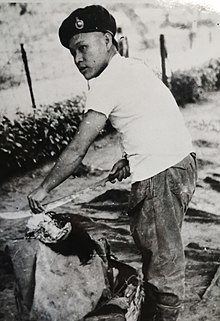
20th century
[edit]During theSecond World War,Japaneseforcesoccupied Borneo and treated all of the indigenous peoples poorly – massacres of the Malay and Dayak peoples were common, especially among the Dayaks of theKapit Division.[19]In response, the Dayaks formed a special force to assist theAllied forces.ElevenUS airmenand a few dozenAustralian special operativestrained a thousand Dayaks from the Kapit Division inguerrilla warfare.This army of tribesmen killed or captured some 1,500 Japanese soldiers and provided the Allies with vital intelligence about Japanese-held oil fields.[20]
During theMalayan Emergency,theBritish Armyemployed Iban headhunters against theMalayan National Liberation Army(MNLA). Typically two would be attached to each infantry patrol as trackers and general assistants, acting as the platoon commander's eyes and ears in this deeply alien environment.[21]News of this was exposed to the public 1952 when the British communist newspaper calledThe Daily Workerpublished multiple photographs of Ibans and British soldiers posing with the severed heads of suspected MNLA members.[22]Initially, theBritish governmentdenied allowing Iban troops to practise headhunting against the MNLA, untilColonial SecretaryOliver Lyttletonconfirmed to Parliament that the Ibans were indeed granted such a right to do so. All Dayak troops were disbanded upon the end of the conflict.[23]
Ibanic regional groups
[edit]Although Ibans generally speak various dialects which are mutually intelligible, they can be divided into different branches which are named after the geographical areas where they reside.[8]
| Sub-ethnic group | Regions with significant population | Note |
|---|---|---|
| Kantu' | Upper Kapuas,West Kalimantan | |
| Ketungau (Sebaru', Demam) | Ketungau River,West Kalimantan | |
| Mualang | Belitang River,West Kalimantan | |
| Seberuang | Seberuang and Suhaid Rivers,West Kalimantan | |
| Desa | Sintang,West Kalimantan | |
| Iban | Lake Sentarum,West Kalimantan | |
| Bugau | Kalimantan–Sarawak border | |
| Ulu Ai/batang ai | Lubok Antu,Sarawak | The first region settled by the Ibans in Sarawak after their migration from Kapuas, West Kalimantan.[24] |
| Remuns | Serian,Sarawak | |
| Sebuyaus | LunduandSamarahan,Sarawak | |
| Balaus | Sri Aman,Sarawak | |
| Saribas | Betong,Saratokand parts ofSarikei,Sarawak | |
| Undup | Undup,Sarawak | |
| Rajang/Bilak Sedik | Rajang River,Sibu,Kapit,Belaga,Kanowit,Song, Sarikei, Bintangor,Bintulu,Limbang, Lawas and Miri,Sarawak Belait and Temburong,Brunei |
The largest Iban sub-ethnic group |
| Merotai | Tawau,Sabah |
Language
[edit]TheIban language(jaku Iban) is spoken by the Iban, a branch of theDayakethnic group formerly known as "Sea Dayak". The language belongs toMalayic languages,which is aMalayo-Polynesianbranch of theAustronesian language family.It is thought that the homeland of theMalayic languagesis inwestern Borneo,where the Ibanic languages remain. The Malayic branch represents a secondary dispersal, probably from centralSumatrabut possibly also fromBorneo.[25]
Religion
[edit]For hundreds of years, the Iban's ancestors practiced their own traditional custom andpaganreligious system.EuropeanChristiancolonialinvaders, after the arrival ofJames Brooke,led to the influence of European missionaries and conversions toChristianity.Although the majority are nowChristian;many continue to observe both Christian and traditional pagan ceremonies, particularly during marriages or festivals, although some ancestral practices such as 'Miring' are still prohibited by certain churches. After being Christianized, the majority of Iban people have changed their traditional name to a Hebrew-based "Christian name" followed by the Ibanese name such as David Dunggau, Joseph Jelenggai, Mary Mayang, etc.
For the majority of Ibans who are Christians, some Christian festivals such asChristmas,Good Friday,Easterare also celebrated. Some Ibans are devout Christians and follow the Christian faith strictly. Since conversion to Christianity, some Iban people celebrate their ancestors' pagan festivals using Christian ways and the majority still observe Gawai Dayak (the Dayak Festival), which is a generic celebration in nature unless agawaiproper is held and thereby preserves their ancestors' culture and tradition.
InBrunei,1,503 Ibans have converted toIslamfrom 2009 to 2019 according to official statistics. Many Bruneian Ibans intermarry withMalaysand convert to Islam as a result. Nevertheless, most Iban in Brunei are devout Christians similar to the Iban in Malaysia. Bruneian Ibans also often intermarry with theMurutor ChristianChinesedue to their shared faith.[27][28]
Despite the difference in faiths, Ibans of different faiths do live and help each other regardless of faith but some do split their longhouses due to different faiths or even political affiliations. The Ibans believe in helping and having fun together. Some elder Ibans are worried that among most of the younger Iban generation, their culture has faded since the conversion to Christianity and the adoption of a more modern life style. Nevertheless, most Iban embrace modern progress and development.
Many Christian Dayaks have adopted European names, but some continue to maintain their ancestors' traditional names. Since the conversion of most Iban people to Christianity, some have generally abandoned their ancestors' beliefs such as 'Miring' or the celebration of 'Gawai Antu', and many celebrate only Christianized traditional festivals.
Numerous local people and certain missionaries have sought to document and preserve traditional Dayak religious practices. For example, Reverend William Howell contributed numerous articles on the Iban language, lore, and culture between 1909 and 1910 to theSarawak Gazette.The articles were later compiled in a book in 1963 entitled,The Sea Dayaks and Other Races of Sarawak.[29]
Culture and customs
[edit]Music
[edit]
Iban music is percussion-oriented. The Iban have a musical heritage consisting of various types ofagung ensembles– percussion ensembles composed of large hanging, suspended or held, Boss ed/knobbedgongswhich act as drums without any accompanying melodic instrument. The typical Iban agung ensemble will include a set ofengkerumung(small gongs arranged together side by side and played like axylophone), atawak(the so-called "bass gong" ), abebendai(which acts as asnare) and also aketebungorbedup(a single sided drum/percussion instrument).
One example of Iban traditional music is thetaboh.[30] There are various kinds oftaboh(music), depending the purpose and types ofngajat,likealun lundai(slow tempo). Thegendangcan be played in some distinctive types corresponding to the purpose and type of each ceremony. The most popular ones are calledgendang rayah(swinging blow) andgendang pampat(sweeping blow).
Handicrafts
[edit]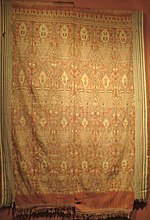
Woven products are known asbetenun.Several types of woven blankets made by the Ibans arepua kumbu, pua ikat, kain karapandkain sungkit.[31]Using weaving, the Iban make blankets, bird shirts (baju burong),kain kebat, kain betatingandselampai.Weaving is the women's warpath whilekayau(headhunting) is the men's warpath. Thepua kumbublanket do have conventional or ritual motives depending on the purpose of the woven item. Those who finish the weaving lessons are calledtembu kayu(finish the wood).[32]Among well-known ritual motifs are Gajah Meram (Brooding Elephant), Tiang Sandong (Ritual Pole), Meligai (Shrine) and Tiang Ranyai.[32]
Land ownership
[edit]Traditionally, Iban agriculture was based on actual integrated indigenous farming system. Iban Dayaks tend to plant paddy on hill slopes. Agricultural Land in this sense was used and defined primarily in terms of hill rice farming, ladang (garden), and hutan (forest). According to Prof Derek Freeman in his Report on Iban Agriculture, Iban Dayaks used to practice twenty-seven stages of hill rice farming once a year and their shifting cultivation practices allow the forest to regenerate itself rather than to damage the forest, thereby to ensure the continuity and sustainability of forest use and/or survival of the Iban community itself.[33][34]The Iban Dayaks love virgin forests for their dependency on forests but that is for migration, territorial expansion, and/or fleeing enemies.
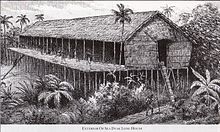
Once the Iban migrated into a riverine area, they will divide the area into three basic areas i.e. farming area, territorial domain (pemakai menoa) and forest reserve (pulau galau). The farming area is distributed accordingly to each family based on consensus. The chief and elders are responsible to settle any disputes and claims amicably. The territorial domain is a common area where the families of each longhouse are allowed to source for foods and confined themselves without encroachment into domains of other longhouses. The forest reserve is for common use, as a source of natural materials for building longhouse (ramu), boat making, plaiting, etc.
The whole riverine region can consist of many longhouses and thus the entire region belongs to all of them and they shall defend it against encroachment and attack by outsiders. Those longhouses sharing and living in the same riverine region call themselves shared owners (sepemakai).
Each track of virgin forest cleared by each family (rimba) will automatically belong to that family and inherited by its descendants as heirloom (pesaka) unless they migrate to other regions and relinquish their ownership of their land, which is symbolized by a token payment using a simple item in exchange for the land.
Agriculture and economy
[edit]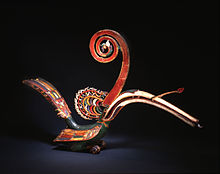
Traditionally, Iban agriculture was based on actual integrated indigenous farming system. Ibans plant hill rice paddies once a year in twenty-seven stages as described by Freeman in his report on Iban Agriculture. Agricultural Land in this sense was used and defined primarily in terms of hill rice farming, ladang (garden), and hutan (forest).[34][page needed][33][page needed]The main stages of the paddy cultivation is followed by the Iban lemambang bards to compose their ritual incantations. The bards also analogizes the headhunting expedition with the paddy cultivation stages. Other crops planted includeensabi,cucumber (rampu amat and rampu betu),brinjal,corn,lingkau,millet and cotton (tayak). Downriver Iban plant wet rice paddy at the low-lying riverine areas which are beyond the reach of the salt water tide.[35]
For cash, the Ibans find jungle produce to sell at the market or town. Later, they planted rubber, pepper and cocoa. Nowadays, many Ibans work in towns to seek better sources of income.[36]
Trading is not a natural activity for the Iban. They did trade paddy for jars or salted fish coming from the sea in the old days but paddy lost its economic value a long time ago. Not much yield can be produced from repetitively replanted areas anyway because their planting relies on the natural source of fertilizer from the forest itself and the source of water for irrigation is from the rain, hence the cycle of the weather season is important and need to be correctly followed. Trading of sundries, jungle produce or agricultural produce is normally performed by the Chinese who commuted between the town and the location of the shop.[37]
Piracy
[edit]
The Sea Dayaks, as their name implies, are a maritime set of tribes, and fight chiefly in canoes and boats. One of their favorite tactics is to conceal some of their larger boats, and then to send some small and badly manned canoes forward to attack the enemy to lure them. The canoes then retreat, followed by the enemy, and as soon as they pass the spot where the larger boats are hidden, they are attacked by them in the rear, while the smaller canoes, which have acted as decoys, turn and join in the fight. The rivers bends are chosen for this kind of attack, the overhanging branches of trees and the dense foliage of the bank affording excellent hiding places for the boats.[38]
Many of the sea dayaks were alsopirates.In the 19th century there was a great deal of piracy, and it was secretly encouraged by the native rulers, who obtained a share of the spoil, and also by the Malays who knew well how to handle a boat. The Malay fleet consisted of a large number of long war boats orprahu,each about 90 feet (27 m) long or more, and carrying a brass gun in the bow, the pirates being armed with swords, spears andmuskets.Each boat was paddled by from 60 to 80 men. These boats skulked about in the sheltered coves waiting for their prey, and attacked merchant vessels making the passage betweenChinaandSingapore.The Malay pirates and their Dayak allies would wreck and destroy every trading vessel they came across, murder most of the crew who offered any resistance, and the rest were made as slaves. The Dayak would cut off the heads of those who were slain, smoke them over the fire to dry them, and then take them home to treasure as valued possessions.[39]
Military history
[edit]
A Dayak war party inproasand canoes fought a battle withMurray Maxwellfollowing the wreck ofHMS Alcestein 1817 at the Gaspar Strait.[40]
The Iban Dayak's first direct encounter with the Brooke and his men was in 1843, during the attack by Brooke's forces on the Batang Saribas region i.e. Padeh, Paku, and Rimbas respectively. The finale of this battle was the conference at Nagna Sebuloh to sign a peace Saribas treaty to end piracy and headhunting but the natives refused to sign it, rendering the treaty moot.[41]
In 1844, Brooke's force attacked Batang Lupar, Batang Undop, and Batang Skrang to defeat the Malay sharifs and Dayak living in these regions. The Malay sharifs were easily defeated at Patusin in Batang Lupar, without a major fight despite their famous reputation and power over the native inlanders. However, during the battle of Batang Undop, one of Brooke's men, British Navy officer Mr. Charles Wade was killed in action at the battle of Ulu Undop while chasing the Malay sheriffs upriver. Subsequently, Brooke's Malay force headed byDatu Patinggi Aliand Mr. Steward was totally defeated by the Skrang Iban force at the battle of Kerangan Peris in the Batang Skrang region.[42]
In 1849, at the Battle of Beting Maru, a convoy of Dayak boats that were returning from a sojourn at theRiver Rajanspotted Brooke's man of war, theNemesis.They then landed on the Beting Maru sandbar and retreated to their villages, with two Dayak boats acting as a diversion by sailing towards theNemesisand engaging her, with the two boats managing to retreat safely after a few shots were exchanged. The next day, the Dayak ambushed Brooke's pursuing force, killing two of Brooke's Iban entourage before pulling back.[43]
Layang, the son-in-law of Libau "Rentap"was known as the first Iban slayer of a white man in the person of Mr. Alan Lee" Ti Mati Rugi "(died in vain) at the Battle of Lintang Batang in 1853, above the Skrang fort built by Brooke in 1850. The Brooke government had to launch three successive punitive expeditions against Libau Rentap to conquer his fortress known as Sadok Mount. In total, the Brooke government conducted 52 punitive expeditions against the Iban including one against the Kayan.[44]
The Sarawak Rangers which were mostly Dayak participated in the anti-communist insurgency during the Malayan Emergency between 1948 and 1960.[45]The Sarawak Rangers were despatched by the British to fight during the Brunei Rebellion in 1962.[46]
Military contributions
[edit]
The Iban are famous for being fearsome warriors in the past in defence of homeland or for migration to virgin territories. Two highly decorated Iban Dayak soldiers from Sarawak in Malaysia are Temenggung Datuk andKanang anak Langkau(awarded theSeri Pahlawan Gagah Perkasa or Grand Knight of Valour)[47]andAwang anak Rawengof Skrang (awarded a George Cross).[48][49]So far, only one Dayak has reached the rank of general in the military, Brigadier-General Stephen Mundaw in the Malaysian Army, who was promoted on 1 November 2010.[50]
Malaysia's most decorated war hero isKanang Anak Langkaufor his military service helping to liberate Malaya (and later Malaysia) from the communists, being the only soldier awarded bothSeri Pahlawan(The Star of the Commander of Valour) andPanglima Gagah Berani(The Star of Valour). Among all the heroes are 21 holders of the Panglima Gagah Berani (PGB) including 2 recipients of the Seri Pahlawan. Of this total, there are 14 Ibans, two Chinese army officers, one Bidayuh, one Kayan and one Malay. But the majority of the Armed Forces are Malays, according to a book –Crimson Tide over Borneo.The youngest of the PGB holders is ASP Wilfred Gomez of the police force.[51]
There were six holders of Sri Pahlawan (SP) and Panglima Gagah Perkasa from Sarawak, and with the death of Kanang Anak Langkau, there is one SP holder in the person of Sgt. Ngalinuh (anOrang Ulu).
In popular culture
[edit]- The episode "Into the Jungle" fromAnthony Bourdain: No Reservationsincluded the appearance of Itam, a formerSarawak Rangerand one of the Iban people's last members with theentegulun(Iban traditional handtattoos) signifying his taking of an enemy's head.
- The filmThe Sleeping Dictionaryfeatures Selima (Jessica Alba), an Anglo-Iban girl who falls in love with John Truscott (Hugh Dancy). The movie was filmed primarily in Sarawak, Malaysia.
- Malaysian singerNoraniza Idrisrecorded "Ngajat Tampi" in 2000 and followed by "Tandang Bermadah" in 2002, which are based on traditional Iban music compositions. Both songs became popular in Malaysia and neighbouring countries.
- Chinta Gadis Rimba(orLove of a Forest Maiden), a 1958 film directed by L. Krishnan based on the novel of the same name by Harun Aminurrashid, tells about an Iban girl, Bintang, who goes against the wishes of her parents and runs off to her Malay lover. The film is the first time a full-length feature film was shot in Sarawak and the first time an Iban woman played the lead character.[52]
- Bejalaiis a 1987 film directed by Stephen Teo, notable for being the first film to be made in the Iban language and also the first Malaysian film to be selected for theBerlin International Film Festival.The film is an experimental feature about the custom among the Iban young men to do a "bejalai" (go on a journey) before attaining maturity.[53]
- InFarewell to the King,a 1969 novel byPierre Schoendoerfferplus its subsequent1989 film adaptation,the prisoner-of-war Learoyd escapes a Japanese firing squad by hiding in the wilds of Borneo, where he is adopted by an Iban community.
- In 2007, Malaysian companyMaybankproduced a wholly Iban-language commercial commemorating Malaysia's50th anniversary of independence.The advert, directed byYasmin Ahmadwith help of theLeo Burnettagency, was shot in Bau and Kapit and used an all-Sarawakian cast.[54]
- A conflict between aproaof "sea-dyaks" and the shipwreckedJack Aubreyand his crew forms much of the first part ofThe Nutmeg of Consolation(1991),Patrick O'Brian's fourteenthAubrey-Maturin novel.
- See American writer Terence Clarke's story collection, The Day Nothing Happened and his novel The King of Rumah Nadai, both of which are placed in Sarawak, Malaysia.
Notable people
[edit]Academia
[edit]- Benedict Sandin,historian and academic
Artist
[edit]- Henry Golding,Hollywood actor; has an English father and Iban mother
National heroes
[edit]- Kanang anak Langkau,national hero of Malaysia; awarded the medal of valour "Sri Pahlawan Gagah Berani" by the Malaysian government
- Rentap,leader of a rebellion against the Brooke administration and used the title of Raja Ulu (King of the Interior)
Beauty pageant titleholder
[edit]- Francisca Luhong James,Miss Universe Malaysia 2020; has an Orang Ulu father and Iban mother
Politicians
[edit]- Jugah anak Barieng,second Paramount Chief of the Dayak people and the key signatory on behalf of Sarawak to theMalaysia Agreement
- Stephen Kalong Ningkan,the firstChief Minister of Sarawak
- Tawi Sli,the second Chief Minister of Sarawak
Sports personalities
[edit]- Haimie Anak Nyaring,Brunei football player
- Suhaimi Anak Sulau,Brunei football player
Others
[edit]- Kho Jabing,a Sarawakian of mixed Chinese and Iban descent who was executed in Singapore for murder
See also
[edit]Citations
[edit]- ^"Penemuan Utama Banci Penduduk Dan Perumahan Malaysia 2020.PDF".
- ^"Iban of Brunei".People Groups.Retrieved25 October2021.
- ^"Ekspresi Cinta dan Kehidupan Orang Dayak Iban {Id}".Kompas. 20 November 2021.Retrieved6 December2023.
- ^ab"Iban".8 December 2023.
- ^Tillotson (1994)."Who invented the Dayaks?: historical case studies in art, material culture and ethnic identity from Borneo".Open Research Library.Australian National University: 2 v.doi:10.25911/5d70f0cb47d77.Retrieved13 May2022.
- ^"Borneo trip planner: top five places to visit".News.au. 21 July 2013. Archived fromthe originalon 16 October 2015.Retrieved3 October2015.
- ^Sutrisno, Leo (26 December 2015)."Rumah Betang".Pontianak Post. Archived fromthe originalon 29 December 2015.Retrieved3 October2015.
- ^abcdefgShin, Chong (2021)."Iban as a koine language in Sarawak".Wacana, Journal of the Humanities of Indonesia.22(1): 102.doi:10.17510/wacana.v22i1.985.
- ^Osup, Chemaline Anak (2006)."Puisi Rakyat Iban – Satu Analisis: Bentuk Dan Fungsi"[Iban Folk Poetry – An Analysis: Form and Function](PDF).University of Science, Malaysia(in Indonesian).
- ^Harrison, Tom (1965)."Borneo Writing".Bijdragen tot de Taal-, Land- en Volkenkunde.121(1): 1–57.doi:10.1163/22134379-90002968.JSTOR27860517.
- ^Simonson, T. S.; Xing, J.; Barrett, R.; Jerah, E.; Loa, P.; Zhang, Y.; Watkins, W. S.; Witherspoon, D. J.; Huff, C. D.; Woodward, S.; Mowry, B.; Jorde, L. B. (8 April 2023)."Ancestry of the Iban Is Predominantly Southeast Asian: Genetic Evidence from Autosomal, Mitochondrial, and Y Chromosomes".PLOS ONE.6(1): e16338.doi:10.1371/journal.pone.0016338.PMC3031551.PMID21305013.
- ^"Ngepan Batang Ai (Iban Women Traditional Attire)"(PDF).8 April 2023.
- ^"Asal usul Melayu Sarawak: Menjejaki titik tak pasti".1 May 2023.
- ^abWadley, Reed L. (2007). "Slashed and burned: war, environment, and resource insecurity in West Borneo during the late nineteenth and early twentieth centuries".Journal of the Royal Anthropological Institute.13:41–66.doi:10.1111/j.1467-9655.2007.00416.x.
- ^Pringle, Robert (1970).Rajahs and Rebels: The Ibans of Sarawak Under Brooke Rule, 1841–194.Cornell University Press. p. 103.
- ^"The Rajahs of Sarawak".The Spectator.29 January 1910.
- ^"Sir James Brooke's personal narrative of the insurrection at Sarawak".The Sydney Morning Herald.31 July 1857.Retrieved22 February2017.
- ^Heidhues, MFS (2003).Golddiggers, farmers, and traders in the "Chinese Districts" of West Kalimantan, Indonesia.SEAP Ithaca, New York. p. 102.
- ^http://pariwisata.kalbar.go.id/index.php?op=deskripsi&u1=1&u2=1&idkt=4[dead link]
- ^Heimannov, Judith M. (9 November 2007)."'Guests' can succeed where occupiers fail ".The New York Times.Retrieved3 December2016.
- ^Wen-Qing, Ngoei (2019).Arc of Containment: Britain, the United States, and Anticommunism in Southeast Asia.New York: Cornell University Press. p. 89.ISBN978-1501716409.
- ^"This is the War in Malaya".The Daily Worker.28 April 1952.
- ^Peng, Chin; Ward, Ian; Miraflor, Norma (2003).Alias Chin Peng: My Side of History.Singapore: Media Masters. pp. 302–303.ISBN981-04-8693-6.
- ^"The Iban of Temburong: Migration, Adaptation and Identity in Brunei Darussalam"(PDF).3 June 2023.
- ^The Austronesians: historical and comparative perspectives.Peter Bellwood, James J. Fox,Darrell Tryon.ANU E Press, 2006.ISBN1-920942-85-8,ISBN978-1-920942-85-4
- ^"2010 Population and Housing Census of Malaysia"(PDF)(in Malay and English). Department of Statistics, Malaysia. Archived fromthe original(PDF)on 1 March 2015.Retrieved17 June2012.checked: yes. p. 108.
- ^"Population by Religion, Sex and Census Year".
- ^Tassim, Fatimah Az-Zahra."Why is the Iban tribe excluded from the official 'tujuh puak Brunei' (seven tribes of Brunei) and what is their experience being born and raised in Bruneian society?".
- ^Sutlive, Vinson; Sutlive, Joanne, eds. (2001).The Encyclopaedia of Iban Studies: Iban History, Society, and Culture.Vol. 2: H-N.Kuching:TheTun JugahFoundation. p. 697.ISBN978-9-83405-130-3.
- ^Matusky, Patricia (1985). "An Introduction to the Major Instruments and Forms of Traditional Malay Music".Asian Music.16(2): 121–182.doi:10.2307/833774.JSTOR833774.
- ^"Ngajat Pua Kumbu Dance".National Department of Culture and Arts, Sarawak.Retrieved22 January2024.
- ^abKedit, Vernon (1 January 2009)."Restoring Panggau Libau: a reassessment of engkeramba' in Saribas Iban ritual textiles (pua' kumbu')"(PDF).Borneo Research Bulletin.40:221–248.
- ^abFreedman, Derek (1970).Report on the Iban.doi:10.4324/9781003136484.ISBN978-1-003-13648-4.
- ^abFreeman, Derek (1955).Iban agriculture: a report on the shifting cultivation of hill rice by the Iban of Sarawak.Colonial research studies. Her Majesty's Stationery Office.
- ^Malcolm Cairns, ed. (2017).Shifting Cultivation Policies: Balancing Environmental and Social Sustainability.CABI. p. 213.ISBN978-17-863-9179-7.
- ^Jayum A. Jawan (1994).Iban Politics and Economic Development: Their Patterns and Change.Penerbit Universiti Kebangsaan Malaysia. p. 41.ISBN96-794-2284-4.
- ^Tagliacozzo, Eric; Chang, Wen-Chin, eds. (8 April 2011).Chinese Circulations: Capital, Commodities, and Networks in Southeast Asia.Duke University Press. p. 11.doi:10.1215/9780822393573.hdl:20.500.12657/25791.ISBN978-0-8223-9357-3.S2CID264101110.
- ^Wood, J. G (1878).The uncivilized races of men in all countries of the world: being a comprehensive account of their manners and customs, and of their physical, social, mental, moral and religious characteristics volume 2.J.B. Burr and Co. p. 1136.OCLC681697209.
- ^Gomes, Edwin Herbert (1912).Children of Borneo.Oliphant, Anderson & Ferrier. p. 12.OCLC262467039.
- ^No. XV. Sir Murray Maxwell, Knight ". The Annual Biography and Obituary. XVI: 220–255. 1832. Retrieved on 25 July 2008. Annual Biography and Obituary, 1832 Vol. XVI, p. 239
- ^Spencer St John: The Life of Sir James Brooke. Chapter IV, p. 51. 1843–1844. Available athttps://archive.org/stream/lifesirjamesbro01johngoog/lifesirjamesbro01johngoog_djvu.txt
- ^Captain Henry Keppel: The Expedition to Borneo of HMS Dido, p.110. Available athttps://archive.org/stream/expeditiontobor00kellgoog/expeditiontobor00kellgoog_djvu.txt
- ^Spencer St John: The Life of Sir James Brooke, The Battle of Beting Marau, Chapter IX, p.174, 1849. Available athttps://archive.org/stream/lifesirjamesbro01johngoog/lifesirjamesbro01johngoog_djvu.txt
- ^Charles Brooke: Tens Year in Sarawak, Chapter I, p. 37. Available athttp:// archive.org/stream/tenyearsinsarwa03broogoog/tenyearsinsarwa03broogoog_djvu.txt
- ^A. J. Stockwell; University of London. Institute of Commonwealth Studies (2004). Malaysia. The Stationery Office. pp. 70–.ISBN978-0-11-290581-3.
- ^Abdul Majid, Harun (2007).Rebellion In Brunei – The 1962 Revolt, Imperialism, Confrontation and Oil(PDF).London, New York: I.B.Tauris. p. 125.ISBN978-1-84511-423-7.
- ^Ma Chee Seng & Daryll Law (6 August 2015)."Remembering Fallen Heroes on Hero Memorial Day".New Sarawak Tribune.Retrieved22 August2016.
- ^Rintos Mail & Johnson K Saai (6 September 2015)."Ailing war hero may miss royal audience this year".The Borneo Post.Retrieved22 August2016.
- ^"Sarawak (Malaysian) Rangers, Iban Trackers and Border Scouts".Winged Soldiers. Archived fromthe originalon 25 December 2017.Retrieved22 August2016.
- ^"Stephen Mundaw becomes first Iban Brigadier General".The Borneo Post. 2 November 2010.Retrieved22 August2016.
- ^"PGB recipient Gomez dies battling cancer".The Borneo Post. 13 February 2013.Retrieved3 September2021.
- ^"Wanted: a jungle belle who knows about love".The Straits Times.3 September 1956. p. 7.Retrieved28 March2017– via NewspaperSG.
- ^"Bejalai (1989)".IMDb.25 March 1990.Retrieved10 August2019.
- ^coconutice (4 September 2007),Maybank Advert in Iban,retrieved27 March2017
General bibliography
[edit]- Sir Steven Runciman,The White Rajahs: a history of Sarawak from 1841 to 1946(1960).
- James Ritchie,The Life Story of Temenggong Koh(1999)
- Benedict Sandin,Gawai Burong: The chants and celebrations of the Iban Bird Festival(1977)
- Greg Verso,Blackboard in Borneo,(1989)
- Renang Anak Ansali,New Generation of Iban,(2000)
External links
[edit] Media related toIban peopleat Wikimedia Commons
Media related toIban peopleat Wikimedia Commons
